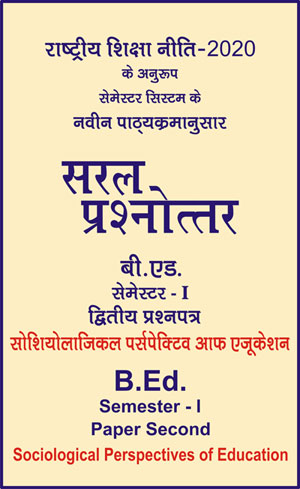|
बी एड - एम एड >> बी.एड. सेमेस्टर-1 प्रश्नपत्र-II - सोशियोलाजिकल पर्सपेक्टिव आफ एजूकेशन बी.एड. सेमेस्टर-1 प्रश्नपत्र-II - सोशियोलाजिकल पर्सपेक्टिव आफ एजूकेशनसरल प्रश्नोत्तर समूह
|
|
|||||||
बी.एड. सेमेस्टर-1 प्रश्नपत्र-II - सोशियोलाजिकल पर्सपेक्टिव आफ एजूकेशन (अंग्रेजी भाषा मे)
Question- Explain the concept of Adult education. Distinguish between various form and nomenclature of Adult education.
Or
Describe the role of NAEP in eradication of illiteracy.
Ans.
National Adult Education Programme (NAEP)
“Social education is roughly inclusive of all the informal education that is given to adults. In India, it has two aspects”:
(a) Adult Literacy : Education those adults who have not received any kind of education in school.
(b) Continuous education : Education of those literates who had given up education prematurely or whose education was discontinued for whatever reasons social education is the responsibility of society, and the following agencies participate in organising it :
The central government realised the importance of adult education to an extent that it changed its name to social education so as to be more inclusive and extensive. The campaign for the adult/social education become a regular feature of our five years’ plans where in plan after plan facilitate he programme which acquired the status of a national movement. Central Audio-visual centre, National Basic Education Research and Training. National social education council were established in Delhi. National council of educational research and training also has a separate department for social education, various universities and colleges had department of Continuing education; Publication of literature Pamphlets and Charts, etc. and Production of such teaching aids like films, etc. made the programme click even in the remote villages. But what gave the spurt to social education at the national level had been the advent of distance education, earlier called correspondence courses, which provides facilities for a large number of academic and professional courses.
The concept of open school and IGNOU (Indra Gandhi National University) and privatisation of higher education, Radio/TV Programmes for various classes at school and college level, gave a boost to social education: This author recalls that as early as 1970s, the university of Mysore would permit individuals to take various university examinations on the basis of age, without any restriction and requirement of going through the normal routeene. A person over 5 years of age could go for post graduation direct without having to go through the traditional way. Indian Adult Education Association, Social Adult Education Committees and the state Adult education council are doing praiseworthy work in the field of social education. The central education advisory councils also adds up its contribution to give direction and to stream line the programme. The sixth plan (1978-83) formulated by Government formed by erstwhile opposition parties laid special stress on eradication of illiteracy, opening of Nehru youth centres and by starting national service scheme, to involve the youth in this national movement.
Objectives of National Adult Education Programme : In order to remove illiteracy from the Indian society, the national adult education programme (NAEP) was launched in 1978. It was based on the following assumptions :
(a) Illiteracy is a serous impediment to an individual’s growth and to country’s socio-economic progress.
(b) Education is not co-terminus with schooling but takes place in most work and life situations.
(c) Learning, working and living are inseparable and significance. Only when correlated with each other.
(d) The means by which people are involved in the process of development are at least as important as the ends.
(e) The illitrate and poor can rise to their own liberation through literacy, dialogue and action.
|
|||||

 i
i 










